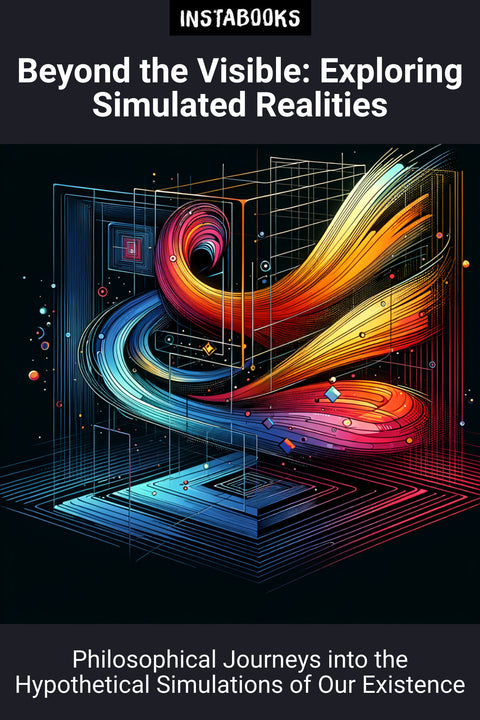
Beyond the Visible: Exploring Simulated Realities
Philosophical Journeys into the Hypothetical Simulations of Our Existence
Included:
✓ 200+ Page AI-Generated Book
✓ ePub eBook File — read on Kindle & Apple Books
✓ PDF Print File (Easy Printing)
✓ Word DOCX File (Easy Editing)
✓ Hi-Res Print-Ready Book Cover (No Logo Watermark)
✓ Full Commercial Use Rights — keep 100% of royalties
✓ Publish under your own Author Name
✓ Sell on Amazon KDP, IngramSpark, Lulu, Blurb & Gumroad to millions of readers worldwide
Introduction to Simulated Realities
Imagine if everything you know, the world around you, your life, your thoughts, even the universe itself, is nothing more than an elaborate computer simulation. This concept, known as the Simulation Hypothesis, is a mind-bending idea that challenges our understanding of reality, pushing philosophical and speculative boundaries. "Beyond the Visible: Exploring Simulated Realities" takes you on an intellectual journey into this fascinating concept, where technology, consciousness, and existence intertwine in unexpected ways.
In-Depth Analysis of the Simulation Hypothesis
The book embarks on a thorough exploration of the Simulation Hypothesis, detailing its origins, key proponents, and the philosophical debates it has sparked. With rigorous research underpinning each chapter, you’ll find insights drawn from thought leaders like Nick Bostrom, Donald Hoffman, and Rizwan Virk. Grounded in philosophical inquiry and speculative thought, this book delves into whether we are living in a computer-generated world, akin to an advanced virtual reality.
Connecting Philosophy and Technology
"Beyond the Visible" skillfully bridges the gap between philosophy and technology, presenting thought-provoking perspectives from various disciplines. Through concise and engaging arguments, this book considers the implications of a simulated reality on our perception of truth and consciousness. By considering contemporary technologies, such as artificial intelligence and virtual realities, it offers a multi-dimensional view of how a simulated existence could potentially function.
Unveiling the Influence of Simulations on Perceptions
A critical examination of how simulations shape our perceptions is at the heart of this book. It investigates how our understanding of reality, molded by evolutionary and social factors, aligns with the tenets of the Simulation Hypothesis. Through compelling examples and in-depth analysis, learn how simulations may influence everything from our sense of identity to societal structures.
The Philosophical Implications of a Simulated Existence
Finally, the book delves into the profound philosophical questions that arise from considering our reality as a simulation. It challenges readers to ponder the nature of consciousness, existence, and whether moral and ethical constructs hold the same meaning within a simulated framework. This engaging exploration invites readers to question the foundational beliefs and encourages them to look beyond the visible.
The Benefits:- Gain a comprehensive understanding of the Simulation Hypothesis.
- Explore interdisciplinary connections between philosophy, technology, and speculative theory.
- Reflect on the philosophical implications of living in a simulated universe.
Table of Contents
1. Understanding the Simulation Hypothesis- Origins and Evolution
- Key Philosophical Debates
- Proponents and Critics
2. Philosophy Meets Technology
- Bridging Philosophical Theories
- Technological Foundations
- Interdisciplinary Perspectives
3. The Nature of Reality
- Perception and Truth
- Consciousness and Experience
- Philosophical Inquiry
4. Artificial Intelligence and Virtual Worlds
- AI's Role in Simulations
- Virtual Reality Conundrums
- Future Speculations
5. Skeptics and Believers
- Skeptical Arguments
- Believers' Insights
- Balancing the Debate
6. The Quest for Truth
- What is Real?
- Philosophical Investigations
- Illusions of Perception
7. Existential Reflections
- Purpose in Simulations
- Existential Questions
- Pathways to Understanding
8. The Simulation Theory in Culture
- Influence in Literature
- Cinema's Take
- Cultural Reflections
9. Moral and Ethical Considerations
- Ethics in Virtual Realities
- Moral Constructs
- Implications of Existence
10. Beyond Perception
- Transcending Realities
- Philosophical Horizons
- Future Philosophies
11. Higher Dimensions and Beings
- Theoretical Constructs
- Exploring Higher Dimensions
- Intelligent Beings
12. Concluding Thoughts
- Integrating Knowledge
- Visionary Insights
- Philosophical Summation
Target Audience
This book is tailored for readers intrigued by philosophical speculations about reality, those interested in the intersection of technology and philosophy, and anyone curious about the Simulation Hypothesis.
Key Takeaways
- Understand the philosophical and speculative dimensions of the Simulation Hypothesis.
- Explore interdisciplinary connections between technology, reality, and consciousness.
- Reflect on philosophical questions about existence and ethical implications in simulations.
- Gain insights from thought leaders like Nick Bostrom and Donald Hoffman.
- Consider the cultural impact of simulated realities in literature and cinema.
